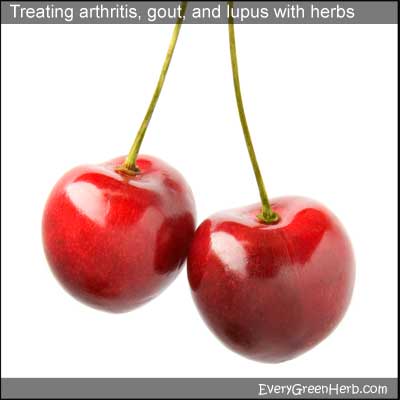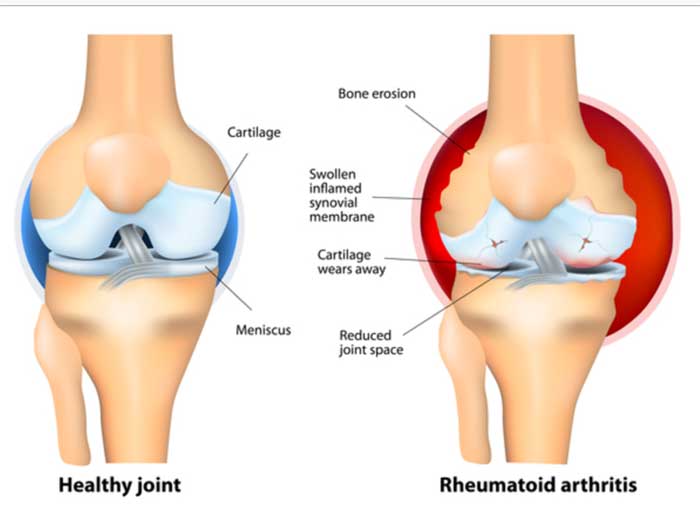Herbs for arthritis

Natural remedies for arthritis pain
Many herbs can help arthritis. Turmeric and alfalfa can stimulate production of the body's cortisone which brings relief from inflammation. Yucca extract, royal jelly, and ginseng are also beneficial.
The healing benefits of ginger work well to fight arthritis and achy joints. Recent scientific trials show that ginger is useful in fighting arthritis pain when taken in extract or tincture form. Ginger works to relieve both morning stiffness and knee pain.
Evening primrose, green drinks, and grape seed oil can work wonders. Sage tea, a dose of cider vinegar, and drinking lots of water can also reduce symptoms.
Herbal creams containing angelica essential oil, cayenne powder, or cannabis oil can help with pain.
Flax seed oil can help with pain management when taken regularly for three to four months. We add ground flax seeds to muffins, cakes, and breads for the taste, texture, and health benefits. We love seeds around here, especially flax seeds, chia seeds, sesame seeds, and poppy seeds. Try eating more seeds, you will be healthier for sure.
Warm Epsom salt baths can also soothe achy joints. Soaking in Epsom salts is a natural remedy for muscle pain brought on by arthritis. Be sure to moisturize your skin after using Epsom salts since it can cause dryness.
What is arthritis?
Arthritis refers to over 100 rheumatic diseases including gout and lupus. Arthritis is a connective tissue disease that affects one out of every four people in the United States and 80% of people over fifty. It can involve the bones, joints, blood vessels, kidneys, skin, eyes, and brain.
Gout is a form of arthritis that is caused by build up of uric acid. It causes pain in the feet - sometimes just the big toe is affected.
Lupus is a form of arthritis that causes the immune system to attack the body's tissues. All forms of arthritis can be helped with herbs and diet changes.

Symptoms of arthritis include pain and stiffness.
Morning stiffness in damp weather and pain during prolonged activity are common signs of arthritis. Redness, swelling, and burning are also common complaints.
Causes of arthritis
Causes of arthritis are sometimes rooted in lifestyle habits including poor diet. Natural therapies based on lifestyle changes work extremely well when treating arthritis.
Losing weight can greatly reduce some types of arthritis conditions.
Other causes of arthritis are calcium deficiency, gland and hormone imbalances, adrenal exhaustion, prolonged use of aspirin, anxiety, and stress. People with arthritis should look for natural ways to reduce stress, since it is known to make all illnesses worse.

Suffering with arthritis?
Try a change of diet.
A good alkalizing diet is recommended. Artichokes, cherries, cabbage, cereal grains, cold water fish, fresh fruit, vegetables, leafy greens, garlic, onions, olive oil, sweet potatoes, squash, eggs, alfalfa sprouts, white grapes, apples, celery seed, and parsley should be eaten regularly.
Vitamin B, C, and E supplements should be taken if necessary due to lack of fresh foods in the diet. If possible, always get your important vitamins and minerals from real food.
Avoid all members of the nightshade family including peppers, eggplant, tomatoes, white potatoes, and tobacco. Mustard, salt, caffeine, colas, and chocolate should also be avoided. If some of these are your favorites, try cutting back on them anyway.
It might be worth switching to cream based sauces instead of tomato based. You might substitute sweet potatoes for the white varieties and cut back on coffee. Drink lots of water, too! It is worth it to suffer less arthritis pain.
Essential oils can help fight arthritis pain and inflammation.
Applications of angelica, frankincense, or wintergreen essential oil, diluted with aloe vera gel or witch hazel, can often reduce inflammation of joints and bring relief from pain.
My favorite plant resin, frankincense is very healing. Try adding a few drops of frankincense essential oil to ready-made ointments and creams. Use on sore knees and aching hips for pain relief.
You can also make your own ointments at home. It's easy and only three ingredients are required. Read more about making herbal products at home.
Get a massage!
A massage with diluted lavender essential oil, lemon essential oil, frankincense essential oil, rosemary essential oil, or sandalwood essential oil is also an excellent herbal remedy for arthritis.
For massage, add a few drops of essential oil to a good almond or other cold-pressed vegetable or nut oil. A gentle, healing touch is always good medicine.
Other herbal massage combinations include eucalyptus essential oil and chamomile essential oil. Use cold-pressed oil (olive oils also works) as a carrier to dilute your essential oils. Never use essential oils without diluting them first, unless you know which ones are safe to use straight. Read more about healing with essential oils.
Herbal compresses can help arthritis pain.
Sometimes warm compresses can give great comfort to aching joints.
Soak a cloth in a decoction of celery seed and rosemary (or any of the essential oils listed above). Apply as needed to the painful area. While you are at eat, eat more celery and celery seeds. Celery is a healing herb, not just a food.
Rheumatoid arthritis affects more women than men.
With rheumatoid arthritis, the connective membranes become inflamed. This can damage bone, cartilage, blood vessels, the heart, and the lungs.
Digestive problems, fatigue, anemia, ulcerative colitis, chronic lung and bronchial congestion, and liver malfunction can develop. See your healthcare provider, try herbal remedies, and watch your diet!
Fight arthritis by keeping your liver healthy with herbal teas.
Stimulating liver function with herbs can help reduce the symptoms of arthritis.
Burdock and dandelion tea are excellent for this purpose. Boil 1 tablespoon of dandelion root with 1 tablespoon of dried burdock root in two cups of water for 5 minutes. Gently simmer for 5 more minutes. Strain and sip throughout the day. Honey may be added for taste.
Other herbal teas for the treatment of arthritis include alfalfa, nettle, and wild yam root tea.
Black cohosh, willow bark and licorice teas are also highly recommended.
Studies on arthritis and herbs
Since effective and safe medicines for arthritis pain have not been discovered, scientists around the world are looking for other treatments. Many doctors are turning to herbs.
After recent studies, frankincense and turmeric seem to show the most promise. Both of these herbal medicines are safe and effective.
Another herb shown to reduce joint pain is chamomile. The flowers can be used externally and internally in teas, creams, ointments, and compresses. More than a delicious beverage, chamomile heals and protects.
Black cohosh, angelica, licorice, gotu kola, and stinging nettle also appear to help arthritis patients.
Exercise helps fight arthritis pain.
Light exercise can really help arthritis. Swimming is an excellent way to loosen up, restore range of motion, and improve joint health. For more information about arthritis, visit arthritis.org.
*Always consult with your healthcare professional before taking any herbal remedy especially if pregnant, nursing, or taking other medication.
Sources:
https://www.ncbi.nlm.nih.gov/pmc/articles/PMC7693010/
https://pubmed.ncbi.nlm.nih.gov/22700248/
Blessings to you and yours!
Thanks so much for reading my blog. Jan.

*Note - the information on this website has not been evaluated by the Food and Drug Administration.
© 2005-2024 website design and content by Janice Boling